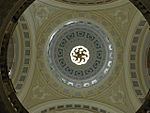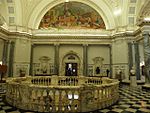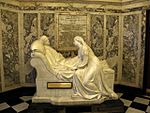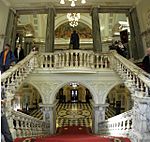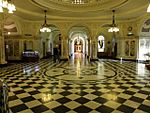Belfast City Hall facts for kids
Quick facts for kids Belfast City Hall |
|
|---|---|
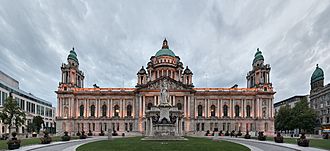
The Belfast City Hall in August 2017
|
|
| General information | |
| Architectural style | Baroque Revival |
| Classification | |
|
Listed Building – Grade A
|
|
| Designated: | 27 November 1975 |
| Reference #: | HB 26/50/001 |
| Location | Donegall Square |
| Town or city | Belfast |
| Country | Northern Ireland |
| Coordinates | 54°35′47″N 5°55′48″W / 54.59639°N 5.93000°W |
| Current tenants | Belfast City Council |
| Construction started | 1898 |
| Completed | 1906 |
| Renovated | 2009 |
| Cost | Approx £360,000 |
| Client | Belfast Corporation |
| Height | Roof – 174 feet (53 m) |
| Design and construction | |
| Architect | Sir Alfred Brumwell Thomas |
| Quantity surveyor | WH Stephens |
| Main contractor | H&J Martin |
Belfast City Hall is a very important building in Belfast, Northern Ireland. It is the main building for the Belfast City Council, where decisions about the city are made. You can find it in Donegall Square, right in the heart of Belfast.
The City Hall faces north and helps separate the shopping and business parts of the city centre. It is also a "Grade A listed building," which means it's a very special historical building.
Contents
History of Belfast City Hall
From Linen Exchange to City Status
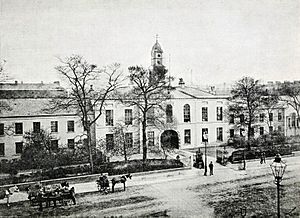
Before Belfast City Hall was built, a place called the White Linen Hall stood on this spot. It was a very important centre for trading Irish linen around the world. The street behind the City Hall, Linen Hall Street, is named after it.
Plans for a new City Hall started in 1888. This was when Queen Victoria gave Belfast "city status." This special title showed how much Belfast had grown. The city was famous for its busy industries. These included linen, rope-making, shipbuilding, and engineering.
At one point, Belfast even had more people living there than Dublin. The city used money from its gas industry to pay for the new City Hall.
Building and Design
The building was designed by Sir Alfred Brumwell Thomas. He used a style called Baroque Revival. It was built using Portland Stone and cost about £369,000. The City Hall officially opened its doors on 1 August 1906. Local companies like H&J Martin helped with the building work.
Did you know that the City Hall in Durban, South Africa, looks almost exactly like Belfast's? It was built in 1910 and was inspired by the Belfast design. The Port of Liverpool Building in England also looks very similar.
Important Events and Changes
On 1 August 2006, Belfast City Hall celebrated its 100th birthday. There was a special exhibition and a family picnic day.
In 2012, the City Council made a decision about the Union Flag. Before this, the flag flew every day since 1906. The Council decided it would only fly on certain special days. This decision caused some protests in Belfast and other parts of Northern Ireland.
Exterior of Belfast City Hall
What the Outside Looks Like
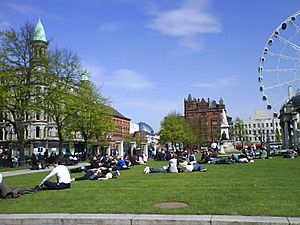
The City Hall has tall towers at each of its four corners. In the middle, there is a large green copper dome. This dome is about 173 feet (53 metres) high.
Look closely at the front of the building. You will see a beautiful sculpture above the main entrance. This sculpture was made by F. W. Pomeroy. Parts of this sculpture can also be seen on some banknotes from the Northern Bank.
Inside Belfast City Hall
Exploring the Interior
The inside of Belfast City Hall is just as impressive as the outside. Some important areas include:
- The Porte-Cochère and Grand Entrance, which is the main entry point.
- The Grand Staircase, a large and fancy staircase.
- The Reception Room, where guests are welcomed.
- The Banqueting Hall, a big room used for special dinners and events.
During World War II, in May 1941, the roof above the Banqueting Hall was damaged. This happened during the Belfast blitz (bombing raids). It had to be rebuilt after the war.
Materials and Art
You will see a lot of beautiful marble inside the building. Different types of marble, like Carrara, Pavonazzo, and Brescia, were used.
There are also many stunning stained glass windows. These windows show:
- The Coat of Arms of Belfast.
- Pictures of Queen Victoria and William III.
- Shields representing the Provinces of Ireland.
- A special window honouring the 36th (Ulster) Division, a famous army division.
Grounds and Public Memorials
Statues and Monuments
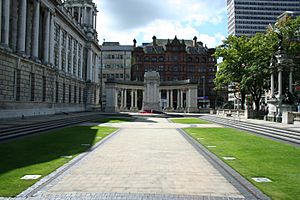
The grounds around Belfast City Hall are like an outdoor museum. They have many statues and memorials.
- A statue of Edward Harland, who founded the Harland and Wolff shipyard, was put up in 1903.
- A statue of Queen Victoria was also unveiled in 1903 by King Edward VII.
- The Titanic Memorial was added in 1920. It remembers those who lost their lives on the famous ship.
War Memorials and Other Tributes
The main war memorial for Northern Ireland is also here. It is called the Garden of Remembrance and Cenotaph. It was unveiled in 1929.
There is also a granite column from 1943. It honours the American Expeditionary Force. Many American soldiers were based in Belfast before D-Day in World War II.
In 1999, a memorial to Leading Seaman James Magennis was placed here. He was a brave sailor who won the Victoria Cross.
Sports and Fun
In 2006, a plan was approved to build a statue of the famous Belfast footballer George Best. He was a very talented player. The statue is still being planned.
For a few years, a large Ferris wheel stood in the grounds. It was 60 metres (200 feet) tall. Passengers could enjoy amazing views of the city from its capsules. The wheel was open from 2007 to 2010.
In 2008, the Imjin River Memorial was moved to the City Hall grounds. This memorial remembers Irish soldiers who fought in the Korean War.
-
Belfast's - Titanic Memorial
-
Monument to Queen Victoria
-
Lord Dufferin monument
-
Memorial to James Magennis VC (2004)
-
Statue of Sir Daniel Dixon, first Lord Mayor of Belfast (1892–93, 1901-04 & 1905-07)
-
Statue of William James Pirrie, Lord Mayor of Belfast (1896–98)
-
Statue of Robert James McMordie, Lord Mayor of Belfast (1910–14)
See also
 In Spanish: Ayuntamiento de Belfast para niños
In Spanish: Ayuntamiento de Belfast para niños
 | Stephanie Wilson |
 | Charles Bolden |
 | Ronald McNair |
 | Frederick D. Gregory |


